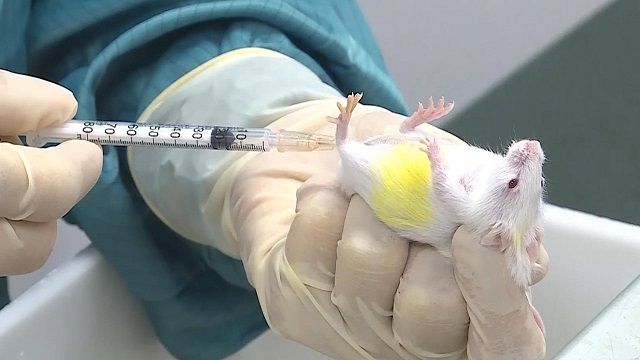 Society
Society

Việt Nam is making progress in its efforts to develop a vaccine for COVID-19, with 50 mice injected with the formula remaining in good health.

|
| VABIOTECH researchers inject a mouse with SARS-CoV-2 antigens. — Photo courtesy of VABIOTECH |
HÀ NỘI — Việt Nam is making progress in its efforts to develop a vaccine for COVID-19, with 50 mice injected with the formula remaining in good health.
The vaccine is being developed by VABIOTECH Co Ltd, a State-owned vaccine manufacturer under the management of the Ministry of Health, as part of a joint project with Bristol University in the UK that started after the first confirmed COVID-19 patient was recorded in Việt Nam and the genetic sequence of the virus was made available.
Professor Đỗ Tuấn Đạt, VABIOTECH chairman, said on Wednesday that the mice were in good health after being injected with the antigens the researchers were working on.
The mice will continue to be monitored to see if they develop an immune response to SARS-CoV-2, the novel strain of coronavirus that is responsible for the ongoing global COVID-19 pandemic.
The evaluation will be conducted in phases, with the first blood test to be conducted after 14-15 days and the second in 28 days. The mice will also be closely monitored every day to see if an immune response is generated.
Scientists hope the antigen, the core part of a vaccine, works well and can elicit a good immune response from the test subjects. The blood samples will be sent to the Central Institute of Hygiene and Epidemiology to be officially evaluated.
If the antigen generates good immune responses, candidate vaccines will be developed and tested on a wider range of animals – especially in larger mammals like monkeys – to test the immune responses before going onto clinical trials on humans.
There are about 100 research groups and developers in the world working on vaccine development at animal testing stage similar to Việt Nam, while eight have already progressed to clinical trials on humans – including an 800-person trial at the UK’s Oxford University.
Việt Nam is closely watching the developments of these trials, and the researchers could consider following in their footsteps if the vaccines proved to be safe and effective.
Đạt said while Việt Nam itself has a vaccine manufacturing industry, this is the first time a vector-based vaccine is being developed so plenty of caution is needed.
For this method, researchers use SARS-CoV-2 antigen to insert into another pathogenic virus that has been weakened to be introduced into the immunised subjects, which hopefully would trigger the body to generate antibodies that are capable of defending itself against the onslaught of the actual full-fledged virus.
Four companies in Việt Nam are currently working on COVID-19 vaccine but VABIOTECH is the first to trial it on mice and obtain encouraging results.
The fact the world has not successfully produced any coronavirus vaccine or antiviral drugs, despite the more lethal strains that have already caused global epidemics like MERS (Middle East Respiratory Syndrome) in 2012 and SARS (Severe Acute Respiratory Syndrome) in 2003-04, adds to the difficulty in making a new one to tackle the current strain.
Mạc Văn Trọng from the Hi-tech Department at VACBIOTECH said the UK was being hit particularly hard by the pandemic, so discussions and evaluation of the antigen could only be conducted online, which was hampering research progress.
VABIOTECH said it would likely take at least 8-9 months before a candidate vaccine could start being trialled on animals.
Even if a working candidate vaccine is produced, it remains to be seen if it can actually make it to the manufacturing stage.
“The development process has been sped up and streamlined as much as possible, but even then it would take quite some time to evaluate the safety and the effectiveness of a vaccine in development,” Đặng Đức Anh from the GSTS Central Institute told Vietnam News Agency.
The WHO previously said that a vaccine would take as long as 18-24 months to be ready, and there was no saying for sure that one could be made at all, even with many different labs and groups pursuing the development of a viable vaccine for the population, or if on-and-off lockdown measures would continue to be in place to curb the spread of the coronavirus which has so far infected nearly 4 million people and killed more than 270,000 worldwide.
Earlier this week, world leaders pledged more than seven billion euros dedicated to the research of COVID-19 vaccines and treatment during a teleconference hosted by the EU, with the promise that poor countries would have equitable access to a viable vaccine, if one can be made.
Not every country is prioritising COVID-19 vaccine research since it is usually a costly business that does not guarantee sure-fire results. Việt Nam's Government, however, remains committed to the development of a working vaccine.
Deputy Prime Minister Vũ Đức Đam earlier has tasked the Ministry of Science and Technology to coordinate with the Ministry of Health, the Việt Nam Academy of Science and Technology and relevant agencies to step up research and production of COVID-19 vaccine and report to the Prime Minister on the progress. — VNS




